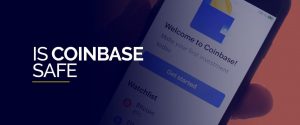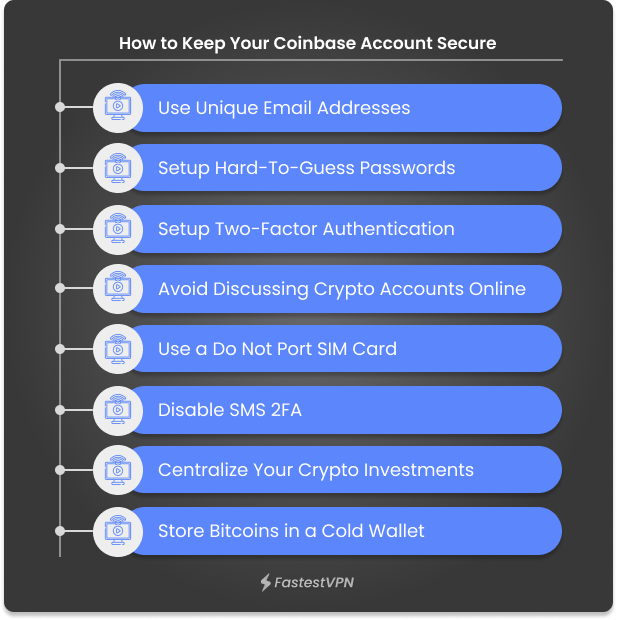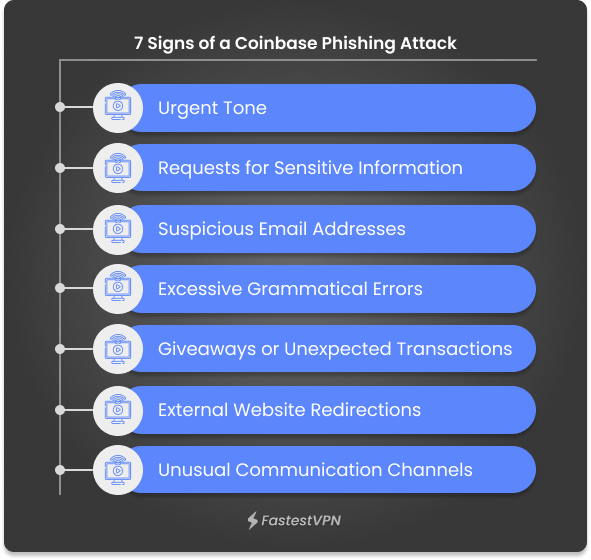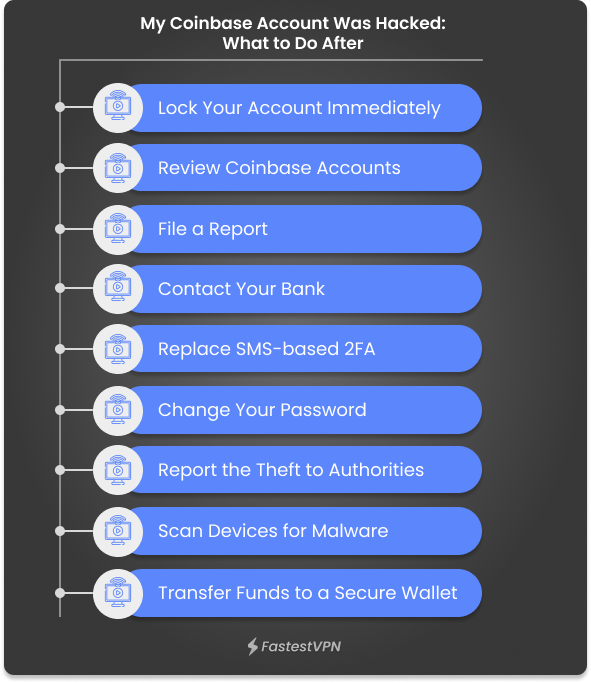

Get 93% OFF on Lifetime
Exclusive Deal
Don’t miss out this deal, it comes with Password Manager FREE of cost.
Get 93% off on FastestVPN and avail PassHulk Password Manager FREE
Get This Deal Now!By Nancy William No Comments 11 minutes
Is Coinbase safe? As a crypto investor, how do you set aside those lingering thoughts about Coinbase and its risks–especially when the web is flooded with Coinbase security nightmares?

Coinbase is a leading cryptocurrency exchange in the United States and the world. It offers a comprehensive platform for advanced trading and investments, but is Coinbase safe to use and if it is, how safe is Coinbase? Keep reading our guide to explore Coinbase security and ways to keep your account secure.
Note: You must use a VPN for Coinbase to ensure added account security. However, remember that Coinbase flags VPN usage as suspicious activity, as hackers may often use them to mask their malicious activities. To avoid this suspicion, ensure using a premium VPN that never falls under the radar. We recommend FastestVPN for its robust security and affordable plans.
Coinbase is recognized as a top-leading cryptocurrency exchange in the United States and worldwide! In fact, it’s one of the best Bitcoin wallets to date. It offers an advanced crypto trading platform as a secure crypto wallet for investors, where users can make crypto payments.
It has a staggering global audience of 56 million, but despite the large pool of users, Coinbase risks remain a nightmare for crypto investors. And, the CNBC report covering a Coinbase user story might raise the hair on the neck.
You can trade 240 crypto assets and 300 different pairs on Coinbase. But, “Is Coinbase secure?” Here’s how it works. This app operates like a stock trading platform, where you can:
While this all sounds cooler than popping the bubbles of a bubble wrap–there’s another side to Coinbase accounts, and that’s what attracts major concern, too.
Since you’re entering your legal information, documents, address, social security number, and a never-ending list, Coinbase knows almost all about you, and that’s where things take a turn. If you’re under the radar of a hacker, it can be a problem.
Brace up for a “longgg” (yeah, very dragged) list of accepted Coinbase crypto coins:
| Aave (AAVE) | Dash (DASH) | DistrictOx (DNT) | EOS (EOS) |
| Ethereum Classic (ETC) | Bitcoin Cash (BCH) | Bancor Network Token (BNT) | Stellar Lumens (XLM) |
| Ripples (XRP) | Tezos (XTZ) | Yearn.finance (YFI) | Zcash (ZEC) |
| 0x (ZRX) | Bitcoin Satoshi’s Vision (BSV) (Send Only) | Bitcoin (BTC) | Celo (CGLD) |
| Compound (COMP) | Algorand (ALGO) | Cosmos (ATOM) | EThe Balancer (BAL) |
| Band Protocol (BAND) | Basic Attention Token (BAT) | Civic (CVC) | Dai (DAI) |
| Ethereum (ETH) | Filecoin (FIL) | Litecoin (LTC) | Decentraland (MANA) |
| Maker (MKR) | Numeraire (NMR) | NuCypher (NU) | OMG Network (OMG) |
| Orchid (OXT) | Ren (REN) | Augur (REP) | The Graph (GRT) |
| Golem (GNT) | Kyber Network (KNC) | Chainlink (LINK) | Loom Network (LOOM) |
| Loopring (LRC) | Synthetix (SNX) | USD Coin (USDC) | Universal Market Access (UMA) |
| Uniswap (UNI) | Wrapped Bitcoin (WBTC) |
Here comes the million-dollar question: Is Coinbase safe and is Coinbase secure? Starting with the technicalities, according to Coinbase, it complies with MSB, AML, and KYC. Its security features include:
While the aforementioned security features list is quite compressed, the original document on the Coinbase website makes it look almost impossible for the platform to be unsafe. Despite that, there are rising stats about leaking Coinbase security, which might make you doubt at the question of “Is Coinbase secure?”. That said, here are the pros and cons of Coinbase:
| Pros | Cons |
| Supports 200+ cryptocurrencies. | Higher trading and transaction fees. |
| User-friendly interface for beginners and advanced traders. | Limited staking options where certain crypto coins can be staked. |
| Robust security features, like cold storage, etc. | Constant criticism over delayed customer service responses. |
| Advanced trading features, like API Support, lower maker-taker fees, and TradingView charts. | Regulatory challenges, such as from SEC. |
| Crypto reward programs. | Credit/debit card transactions incur high fees. |
Now that you know about “Is Coinbase secure?” Here are the 3 recent cases of Coinbase leaks:
According to IDStrong, in 2021, over 6,000 Coinbase users fell victim to a breach that exploited the platform’s SMS-based two-factor authentication (2FA) system. Hackers leveraged a flaw in the SMS Account Recovery process to intercept 2FA tokens and gain unauthorized access to accounts.
As a result, users lost their:
Coinbase mentioned phishing and social engineering techniques leading to this breach and worked on addressing the vulnerability.
Despite that, ABC Action News investigator Adam Walser reports that in various instances, cyber-criminals have drained user accounts instantly. Following that, he mentions that these funds aren’t recoverable. One of the named victims was couple Tanja and Jared Vidovi,c who lost 3 years’ worth of cryptocurrency investments, a total of $170,000.
In 2017, both victims, Adam Dachis and Cody Brown, resorted to Coinbase “security measures” of Two Factor Authentication and Authy. However, all results of security precautions were in vain as their accounts were still hacked robbed, and still no signs of being refunded.
There really is no real solution to stopping the overall hackings from happening on Coinbase, but that does not mean users should sit by and do nothing about it. There are still ways for you to secure your crypto wallet and slow down the overall theft rate.
Coinbase boasts robust security features, yet the data breaches say otherwise. That said, here are 8 ways to keep your Coinbase account secure:

If you create an account for Coinbase, make sure you sign up using a separate and unique or unidentifiable email address. Never use the same email ID as other media accounts.
Longer or complex passwords are the right direction to go in, and just in case you’re not sure about how to create them, maybe the best password manager could help.
It is necessary to set up two-factor authentication and a Coinbase vault for offsites.
Make sure you don’t discuss anything about cryptocurrency online and the possibilities of you creating your account.
Using a “do not port” SIM card prevents your phone number from transferring to another SIM card without rigorous identity verification. However, ensure beforehand that your mobile carrier supports this request.
Turn off the SMS 2FA just in case it leads to an attack and compromises your email. Moreover, doing so prevents the risk of phishing attacks, message interception, susceptibility to SIM-swapping attacks and account recovery exploits.
To avoid your Coinbase account from getting hacked through your computer, it might be wise not to keep all your cryptocurrency investments in one place.
Cold Wallets aren’t connected to the internet, making them immune to cyber threats. These ensure full control over your private keys, which are crucial for accessing and managing your Bitcoin. That said, ensure storing all your cryptocurrencies in a Cold Wallet.
Coinbase is most certainly not 100% secure, as no software or app is. That’s why we recommend taking active precautions in any way you can.
Now that you know about “Is Coinbase secure?” Detecting a phishing attack is never a piece of cake. However, here are the 7 common signs of a Coinbase phishing attack:

Here’s the first sign of a phishing attack: an urgent tone. It can be a discount, an offer, or a too-good-to-be-true deal that pressurizes you to act urgently. Before you even know it, the black hats get to access your account details.
Speaking about “is Coinbase secure?” Coinbase never asks for your personal information, such as login credentials and account details. If you’re getting any such requests–that’s a red flag!
Coinbase will contact you via its official or, at least, a formal email address ending with “@Coinbase.com.” However, any other unverified address can be a scammer.
You never expect a professionally written email with over a hundred Grammarly runs from a scammer. Most phishing emails are quite poorly written, with excessive grammatical errors, along with the above-mentioned signs.
Most phishing emails claim that you’ve received unexpected funds or promising giveaways. These will require either some data to be revealed or require verification for the steps to recover your Coinbase account as instructed.
If it’s Coinbase emailing you, why would you get redirected to another external website upon clicking any email link? That’s a major red flag! Doing so will leak your credentials and other sensitive data in no time.
Coinbase doesn’t use instant messaging apps, like Facebook Messenger, WhatsApp, etc, to contact you. Instead, it will be via a verified email.

There’s no guarantee that a compromised Coinbase account’s funds will return to your bank account. If you think your Coinbase account was hacked, then follow the steps below to secure it as soon as possible. Here are 9 steps to take if your Coinbase account was hacked:
Check if you can access your account. If yes, then log in to Coinbase and go to “Lock My Account.” Contact Coinbase customer support to freeze your account from any further unauthorized access.
After locking the account, review your accounts and check the bank statements to check for any signs of fraud. In case there are any unfamiliar transactions, file a report via Coinbase and the bank.
Contact Coinbase support via the site, app or its email. Request for filing a report by providing all your relevant details, such as timestamps of unauthorized activity and proof of ownership of your account.
Contact your bank, which is connected to the Coinbase account, and inform them about the breach. Request a fraud alert and block or replace the compromised cards.
Replace the current SMS-based 2FA with an authenticator app like Authy or Google Authenticator for improved security. But, if the previous 2FA is compromised then remove the previous phone number connected to your Coinbase account.
If you can still access your account, then immediately change the password to a new, unique and complex one. Avoid reusing passwords across accounts.
Notify the local law enforcement, such as:
Doing so will document the incident and assist with potential recovery efforts
Run a malware scan on all devices connected to Coinbase to check for file and fileless malware. Remove all suspicious files if the antivirus detects destructive malware or infected files. You can also reset your device but ensure that you back up the data before doing so.
If there are any funds left in your account, then consider transferring them into a secure wallet.
Despite Coinbase’s security features answering your question of how safe is Coinbase, according to Coinbase Help Center, the Legacy Coinbase Account Protection, it will not cover reimbursement if you voluntarily send a payment to a third party in case of a scam. Moreover, since you mostly share your details unintentionally during a scam, it’s usually unlikely you'll get a return if you’ve been scammed.
If you're receiving emails from Coinbase even though you don't have an account, then that's a phishing scam. To verify this, look for signs of a potential phishing scam, such as:
Yes, it does offer 2FA, Authy, one-time passwords, and other measures.
Regardless of what cryptocurrency exchange you’re using, a Virtual Private Network could help lower the overall risks. Firstly, you will be able to sign in to your Coinbase account using a US server if you ever find yourself traveling abroad or out of the permissible region. Secondly, a VPN offers double the encryption, online privacy, and protection against phishing or malware attacks. However, you must remember that it might not solve the overall safety of using Coinbase, but it does help to a degree. We recommend using a reliable and affordable provider such as FastestVPN since it offers top-grade security features.
Is Coinbase safe, and is Coinbase secure? Coinbase is a trustworthy Crypto trading platform that leverages robust security features, such as Cold Storage, 2FA, password protection, and insurance. However, we recommend taking the steps to protect your Coinbase account due to lingering cyberthreatst.
How safe is Coinbase? It is safe to keep your money in Coinbase as long as you implement all security measures to ensure data safety, such as setting up complex passwords, a 2F,A and a connection to a reliable VPN, like FastestVPN.
Is Coinbase safe and is Coinbase secure? It is safe to use Coinbase right now if you take all steps to keep your Coinbas account secure. For example, setup 2FA, use the Coinbase vault and other measures as mentioned in the above-mentioned guide.
This guide briefly covered the question, “Is Coinbase safe to use?” Conclusively, yes, it is. Considering its robust security features, it seems to be a secure platform. However, the recent Coinbase breach cases say otherwise.
As a recapitulation, it’s safe as long as you mitigate the cyber threats by following all the steps outlined in this guide to protect your Coinbase account. That said, ensure that you connect to a reliable VPN, like FastestVPN, for improved cybersecurity when trading crypto on Coinbase.
© Copyright 2025 Fastest VPN - All Rights Reserved.


Don’t miss out this deal, it comes with Password Manager FREE of cost.
This website uses cookies so that we can provide you with the best user experience possible. Cookie information is stored in your browser and performs functions such as recognising you when you return to our website and helping our team to understand which sections of the website you find most interesting and useful.
Strictly Necessary Cookie should be enabled at all times so that we can save your preferences for cookie settings.
If you disable this cookie, we will not be able to save your preferences. This means that every time you visit this website you will need to enable or disable cookies again.